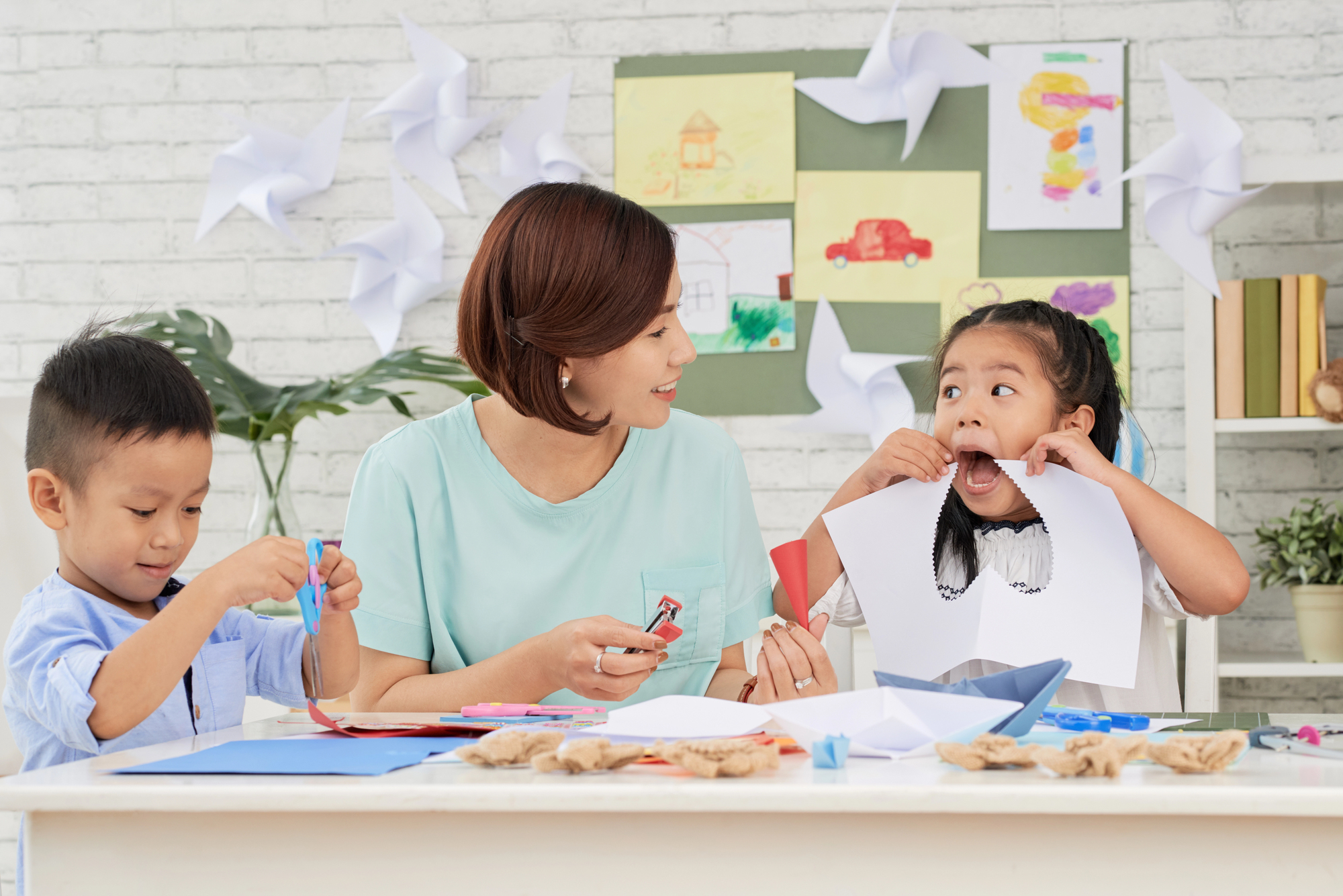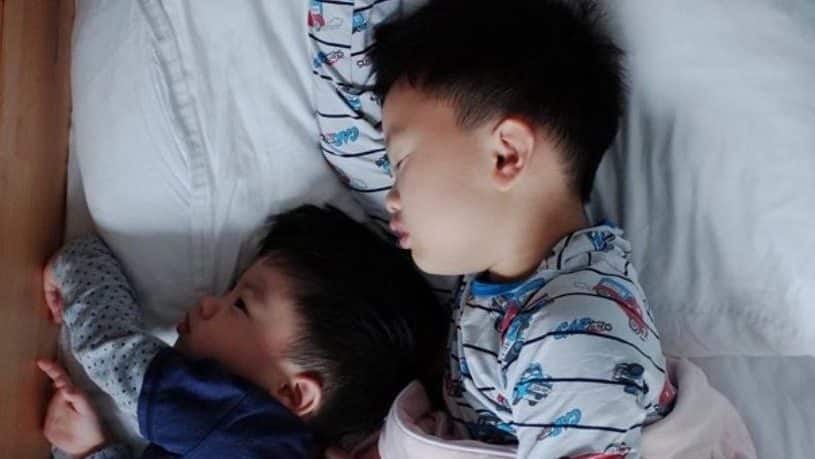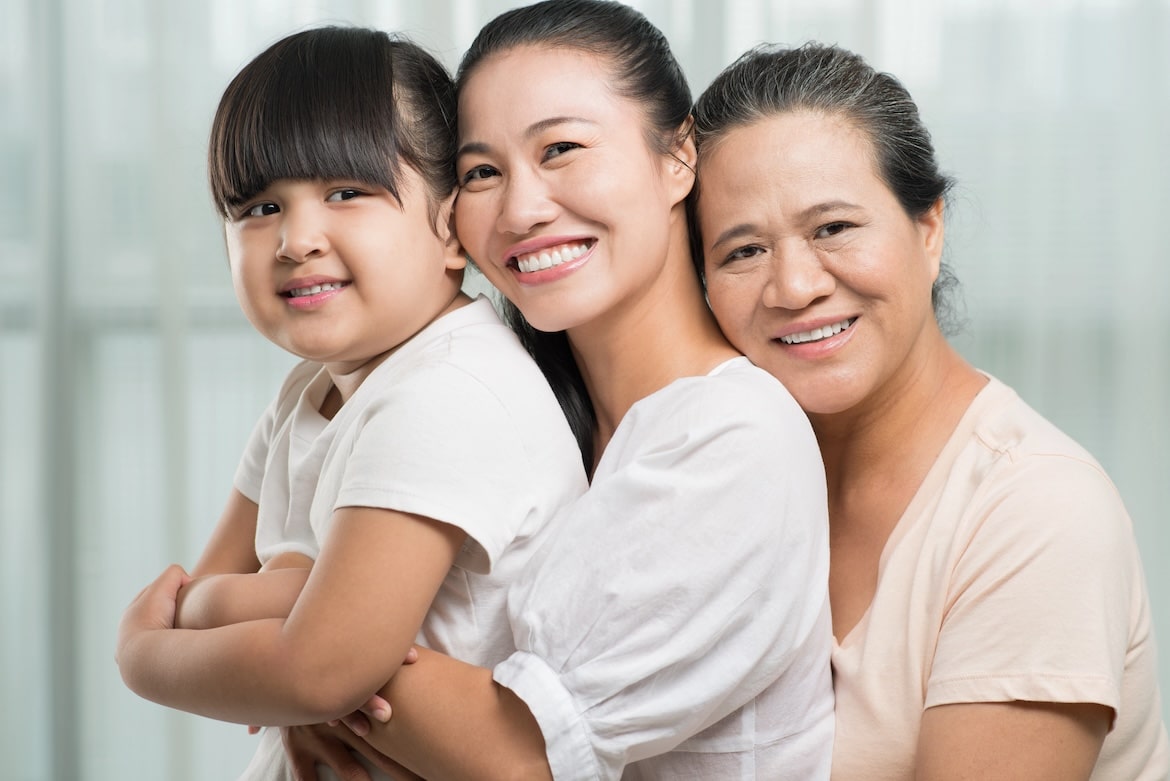“We’re not poor. We’re rich in family time”: Eight-kid single-income family has no tuition, helper or car
Priscilla Goy // April 22, 2022, 6:43 pm
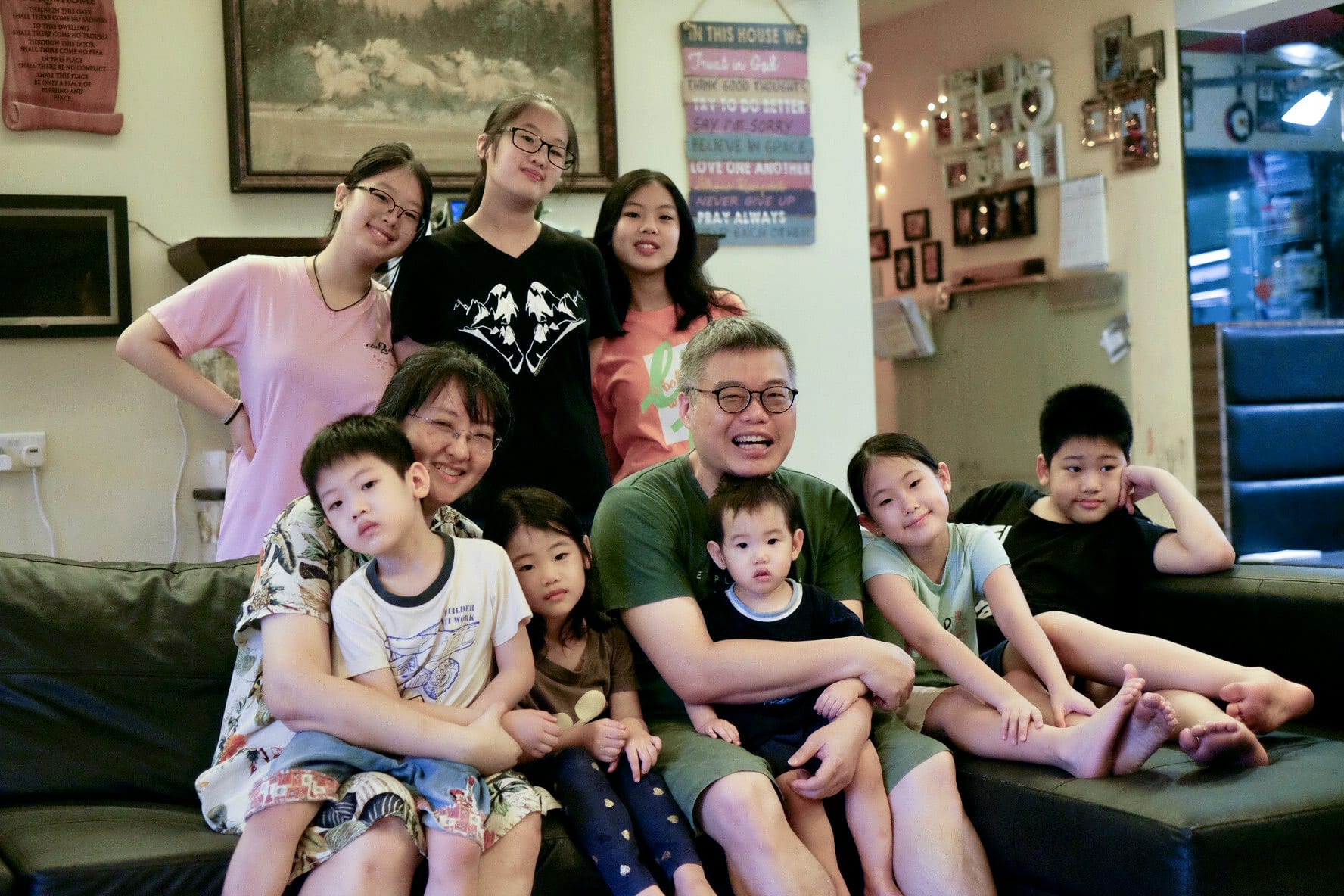
"Values education is way more important than results, enrichment and tuition," say parents Michael and Karen See, who encourage their children to be kind and giving. All photos by Tan Huey Ying.
“We have a life in here,” said sisters Ariel and Lael See, when asked what takeaway message they hope to give or what misunderstanding they hope to clarify, after a news article on their family was published recently.
Their family of 10 had appeared in a Straits Times story with the headline “Feeding 8 kids on $300 a week”, as part of a larger feature about how big families cope with rising costs of living.
“Some people felt that we ‘very poor thing’, like we have no money at all, but actually we’re quite okay. We’re quite happy too,” said eldest child Ariel, 16.
All this despite the family having a sole breadwinner, no car, no childcare or tuition for the kids, no confinement nanny or domestic helper, and the children having mobile phones inherited from parents, as well as many hand-me-down clothes. The children also generally do not go for enrichment programmes, apart from swimming lessons at a neighbourhood pool.
Expenses aside, the sheer number of children in the family – eight children, and all from individual pregnancies (that is, no twins or triplets) was enough to get netizens wondering how the See parents raise their brood, with some debating over whether the children were “deprived” or “missing their quality of life”.
Meet the Sees
Michael See and his wife Karen, are both aged 46. The couple met as classmates in Anglo-Chinese Junior College and got married at the age of 26 in 2002.
“They know that we love them a lot, but there are a lot of things that we don’t go for, like cars or overseas trips to faraway places.”
Their children are aged one to 16, spaced two or three years apart. Besides Ariel, the others are (in descending order of age): Katriel, 14; Lael,12; Samuel, 10; Zuriel, seven; Gabriel, five; Iriel, three; and Joel, one.
The Christian couple had two miscarriages: One before Ariel was born, and one after Samuel was born.
All eight children’s names are in Hebrew and end with “-el”, which means “of God”. They also have middle names, “so that Dad and Mum both have a say in their names”, said Michael. But not all first names are chosen by him and not all middle names are chosen by his wife; they individually pray for the names before coming together to discuss the choices.
The Chinese names start with 亮 (liang), which means “shining”, with the last character based on a fruit of the Spirit (Galatians 5:22-23).
“We pray for the ‘fruit’ to be used for that child before choosing it. So far, each child has been rather reflective of the chosen fruit.”
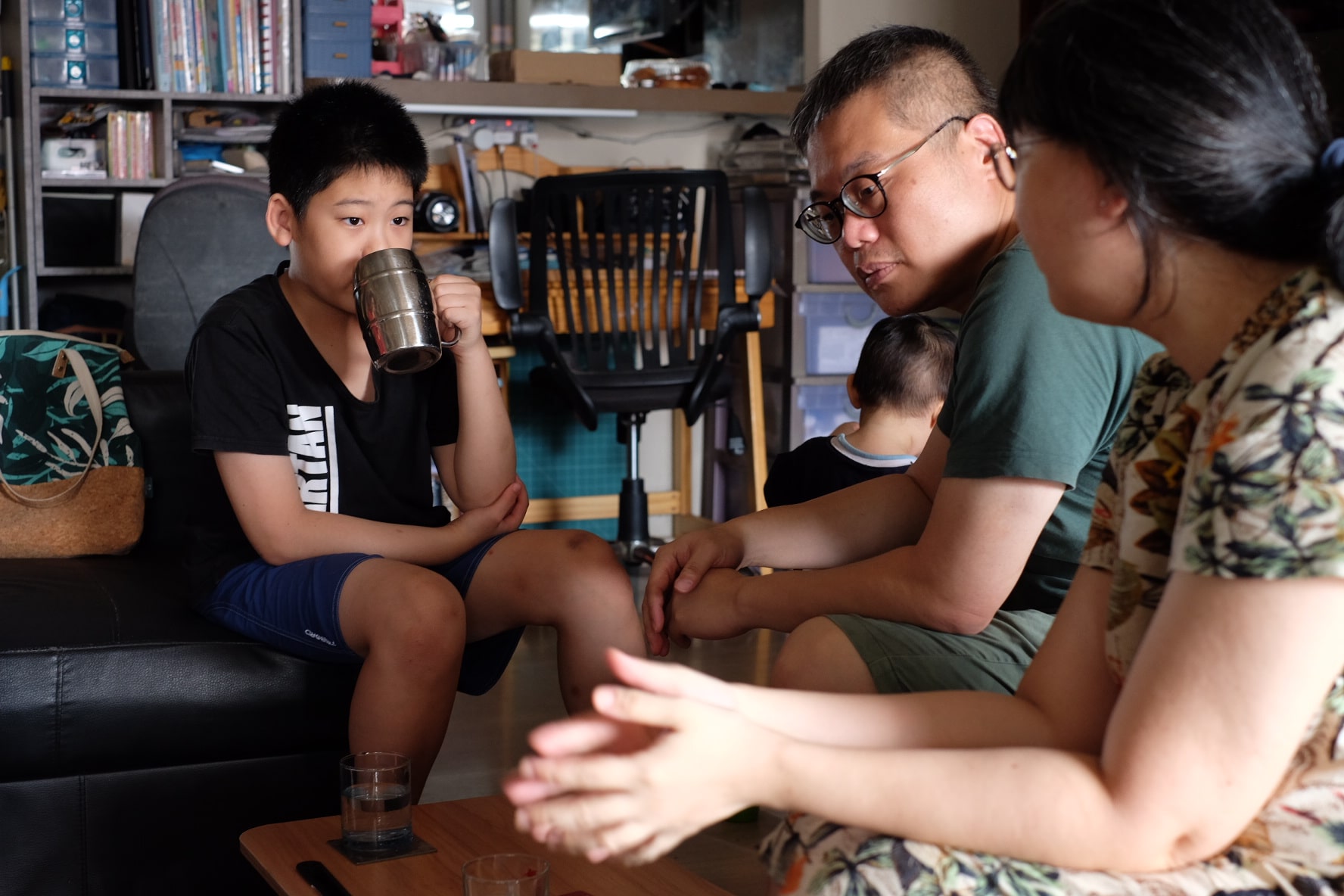
Samuel, 10, was the first to wake up from his Saturday afternoon nap and chose to listen in to the Salt&Light interview attentively while one-year-old Joel played quietly in the background.
The only fruit of the Spirit yet to be used in a child’s name is that of patience or forbearance (忍耐).
The children went/go to their parents’ alma mater primary schools: Singapore Chinese Girls’ School for the girls, and Anglo-Chinese School (Primary) for the boys.
The family lives in a jumbo flat in Marsiling with three bathrooms and five bedrooms: The parents with baby Joel in the master bedroom, Ariel in a cosy 4m2 bedroom that was set up last year by creating a partition in the living room, and two siblings each in the rest of the rooms.
Spending on essentials
While the family lives frugally, the Sees point out that their children are not under-fed.
Eldest child Ariel even replied to a reader’s comment in The Straits Times’ Instagram post that the “$300 a week” refers only to expenses on groceries. Michael said some readers may not have realised this if they did not read the full story, which is behind a subscription paywall.
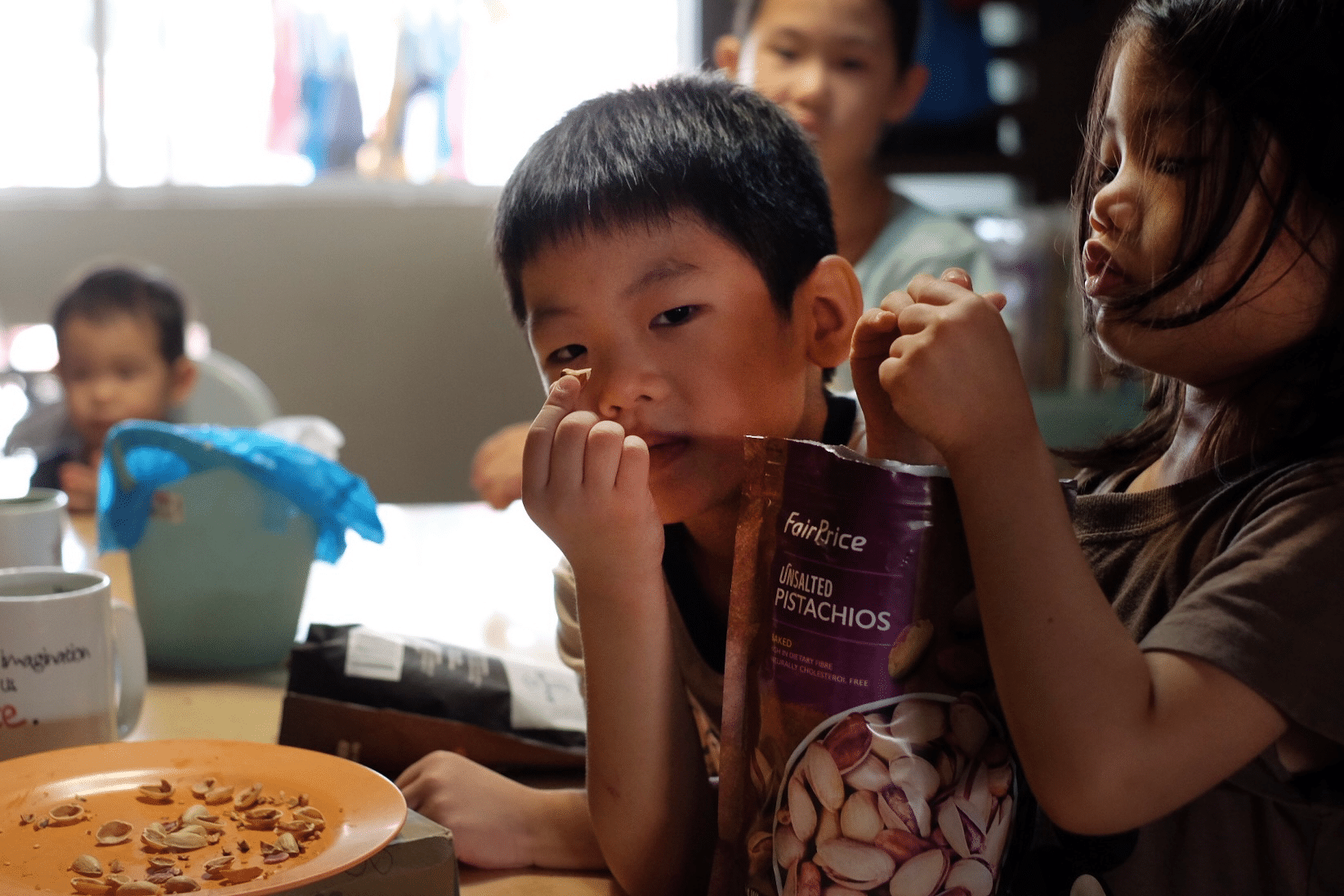
Gabriel, 5, also known as “六哥” snacking on housebrand pistachios before dinner with Iriel, 3, next to him. Zuriel, 7, and Joel, 1, are in the background.
Michael added: “Other monthly bills come in as well. Main ones are $300 for utilities, $200 for internet and phone bills, $1,000 for insurance, $500 for transport, and $500 for eating out (for about three occasions).”
The parents encourage a diet of less carbs and more proteins, but even with 1½ cups of basmati rice used for each family meal, there is enough food to go around. Karen explains that when cooked, 1½ cups of basmati rice – which has a healthier glycemic-index value – expands to the volume of about two cups of jasmine white rice. She has also stopped eating rice about two years ago, after the birth of Joel, as she felt it made her more lethargic.
There are also snacks, biscuits and yoghurt available that the kids can help themselves to.
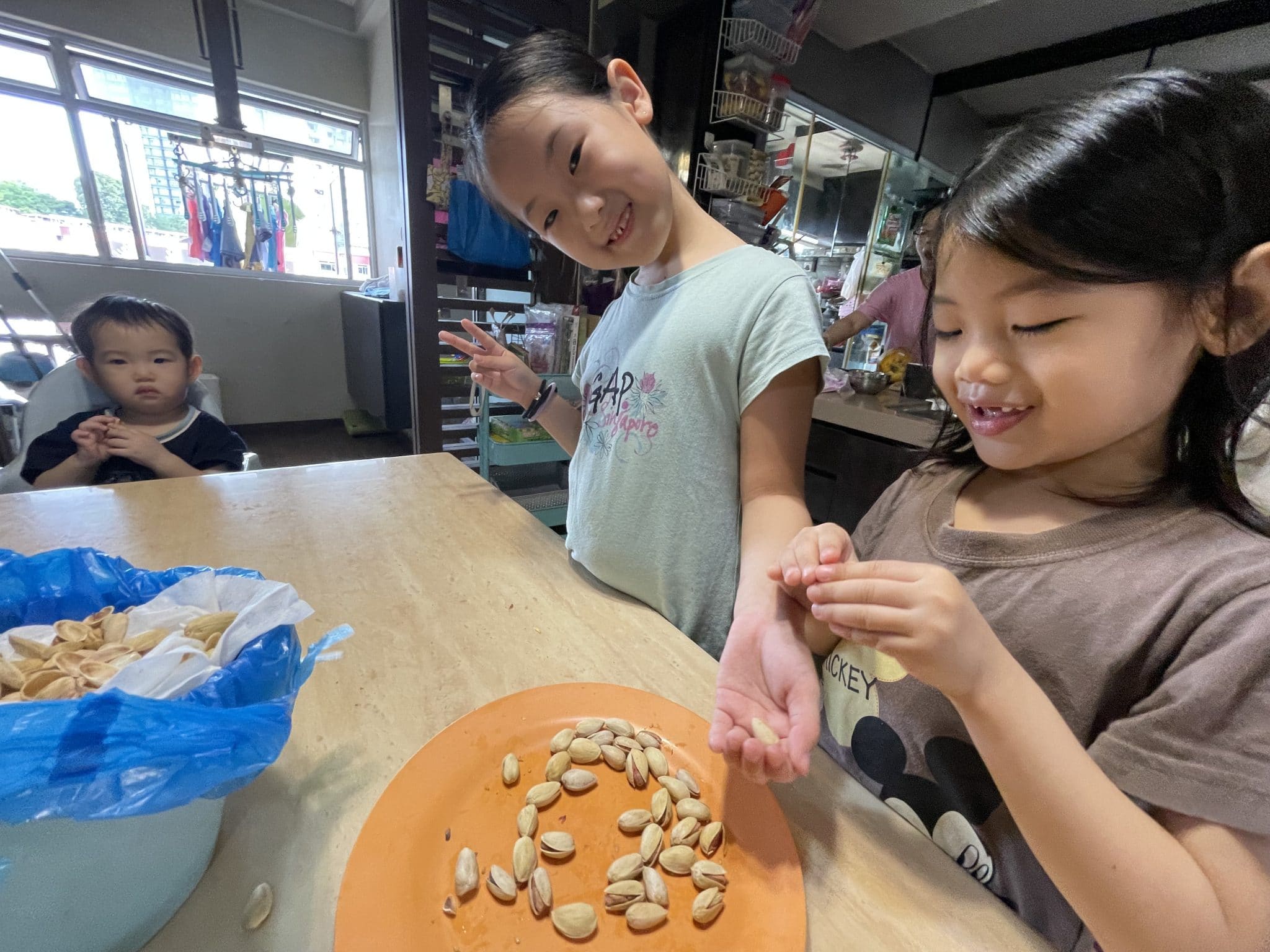
Sisters Iriel (right) and Zuriel (middle) enjoying their pre-dinner snack of pistachios.
They stretch their dollar and keep costs down by, for instance, waiting for items to be on offer before buying them. The older children are amused that Lael has had offers from people to buy her Ruffles chips, after the news article reported that Michael vetoed her request to buy a $4.75 bag of Ruffles chips. Karen explains that the veto was because it has previously been sold at significantly lower prices when it was on offer.
“We asked if we should get a car, they said ‘no’, because then they can’t sit on our laps as we would have to concentrate on the road.”
Meanwhile, the four older children each have a laptop, while seven-year-old Zuriel uses Karen’s laptop for home-based learning. All the school-going children have mobile phones, with at least the three older ones each having an Instagram account like other typical teenagers. All the bedrooms except Ariel’s have air-conditioning. The family also has Disney+ and Netflix, which were complimentary when the family renewed their Starhub TV contract.
Over the years, the children have learnt to anticipate the questions they could face when asking their parents for something new: “Is it useful for your life? You’re going to throw it somewhere in your room after you get it, right?” They learnt to justify their expenses, but they are also “used to it” when their requests get rejected.
In many instances, they do not seem to mind having less than what many of their peers have.
No tuition or enrichment classes? “I’m glad I don’t have to go for that,” said Lael.
“In primary school, a lot of them have tuition, then piano class, then dance class. Then they take so long to reply my text (messages), like three hours later. I wanted to know the homework right now, but they end up replying to me only after three hours.”
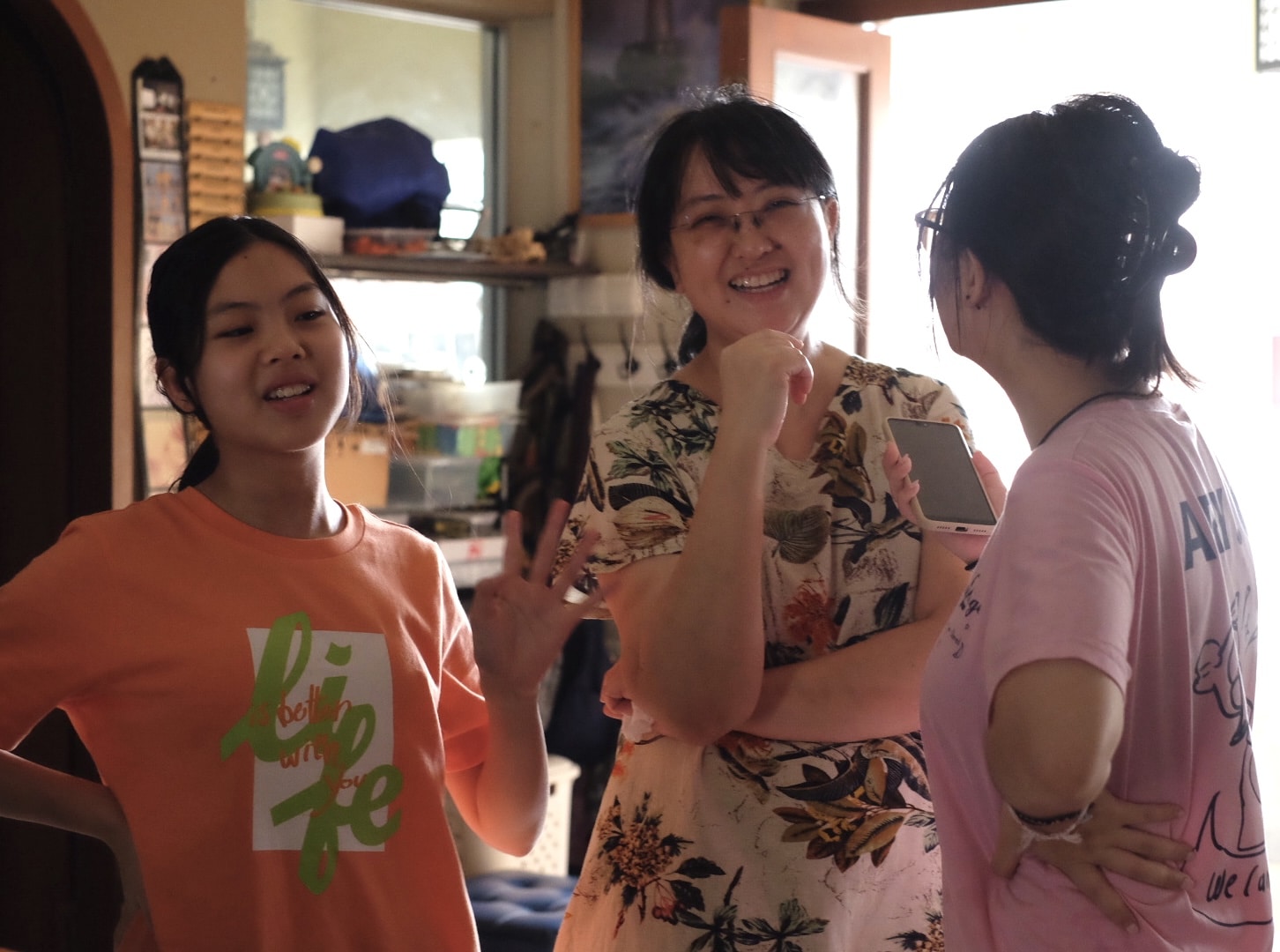
Lael and her sister, Ariel, share a light-hearted moment with their mother, Karen.
No overseas holidays? Their last family holiday overseas was to Australia, when there were four kids around. The three older sisters unanimously said they don’t like holidays.
“Home is fine. Home is where my butt lives,” said Katriel, to much laughter from her sisters. “I want to stay at home. If we go on holiday, we cannot game (play video games).”
On multiple occasions, God has also provided for their needs.
What about friends having more shoes? Apart from school shoes, each See child has just one pair of shoes.
“Their shoes are expensive,” said Ariel. “$100 for one pair and it barely works. Like, after a month, it breaks and I’m just like ….”
While the children have gone to “branded” primary schools because they are Michael and Karen’s alma mater, Michael said the children’s volunteering experiences from young have exposed them to children from lower-income families with less food and materials, and made them more grateful for what they have.
They also do not go for optional enrichment programmes introduced by the schools, even if most of their classmates do.
Said Michael: “I think they’ve grown up knowing that our family is different. They know that we love them a lot, but there are a lot of things that we don’t go for, like cars or overseas trips to faraway places.
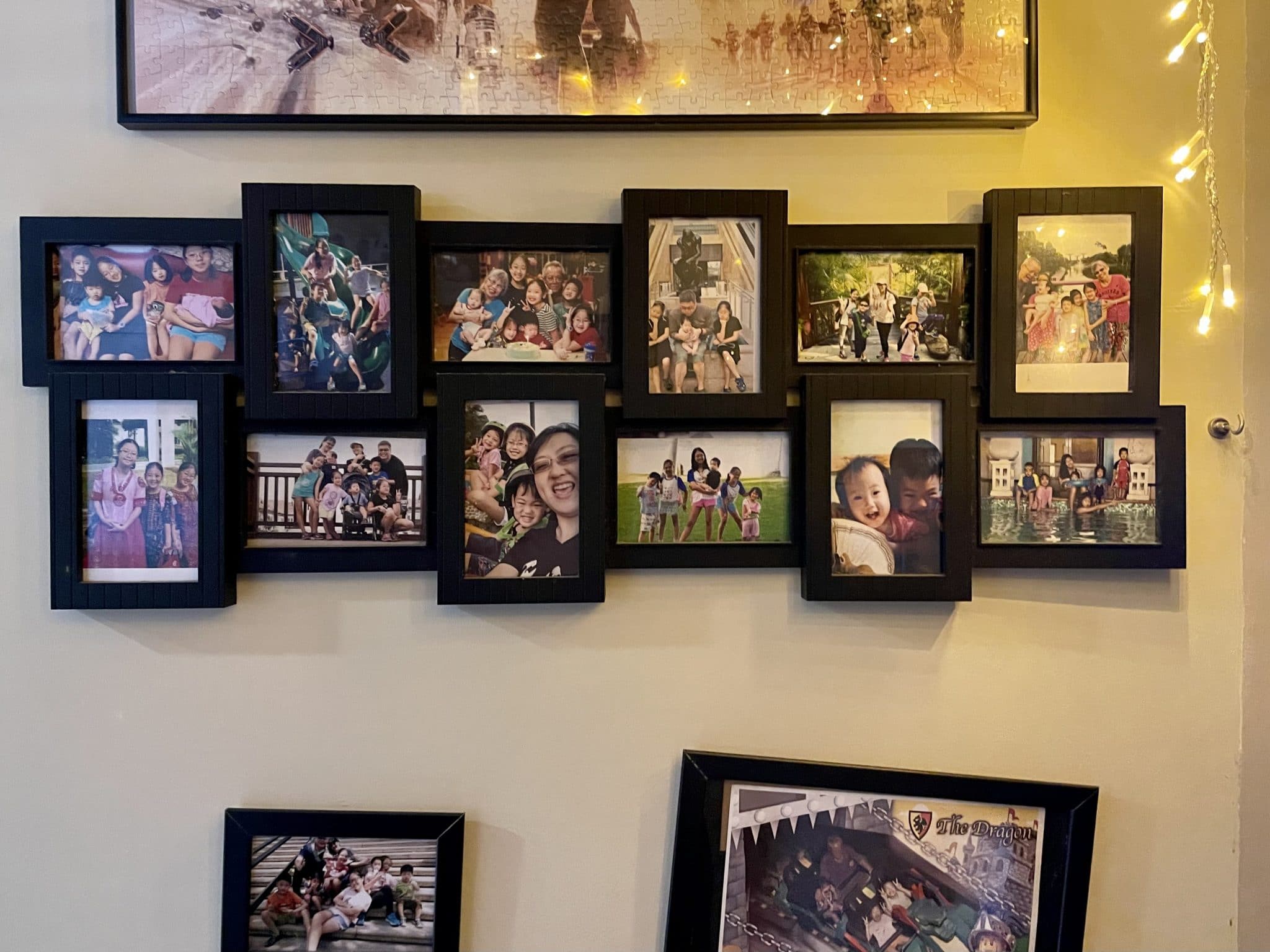
Family photos are hung up across the walls of the house.
“They understand and they’re very supportive. They know that we’re not considered poor, but we’re rich in family time. A lot of their friends – they don’t meet their parents the whole week because the parents are busy working, or flying overseas in pre-Covid times.”
“I’m a teacher, but when I come home, I’m a father.”
What about a car? Few people would question the decision to buy a car for a family of 10.
“When we had only three kids, we once asked them if they think we should get a car. Their answer surprised us. They said ‘no’, because if we got a car, then they can’t sit on our laps and talk to us freely as one of us would have to concentrate on the road.”
On multiple occasions, God has also provided for their needs, said the Sees, be it in providing a new bus service so the children can get to school more easily, or a larger house at no extra cost.
They add that they do consider their financial capabilities and do not ask for handouts from the Government or charities, or even the church.
‘Never focus on results’
When asked how their children fare in school, Michael said: “The kids are okay in their studies. We expect them to try their best. We don’t really set expectations for their results, so long as they try their best – meaning that they do revise and study for spelling and tests and so forth.
“If my kids are getting A’s but not caring for the community … I’ll be the saddest dad in this country.”
“Process is always more important than the results. Isn’t it better to do their best? Love them, no matter what results they get.”
This comes from parents who have experience as teachers. Karen was a mathematics teacher in a secondary school before she became a stay-at-home mum when the kids came along; Michael currently teaches ICT in a specialised school catering to academically weaker students. At least half of the student intake for such schools have special education needs.
“I’m a teacher, but when I come home, I’m a father,” he said.
“As a teacher, there’s my work expectations and KPIs related to results. But at home, my kids need more than good results. The values are more important. We focus on the effort, not the results.”
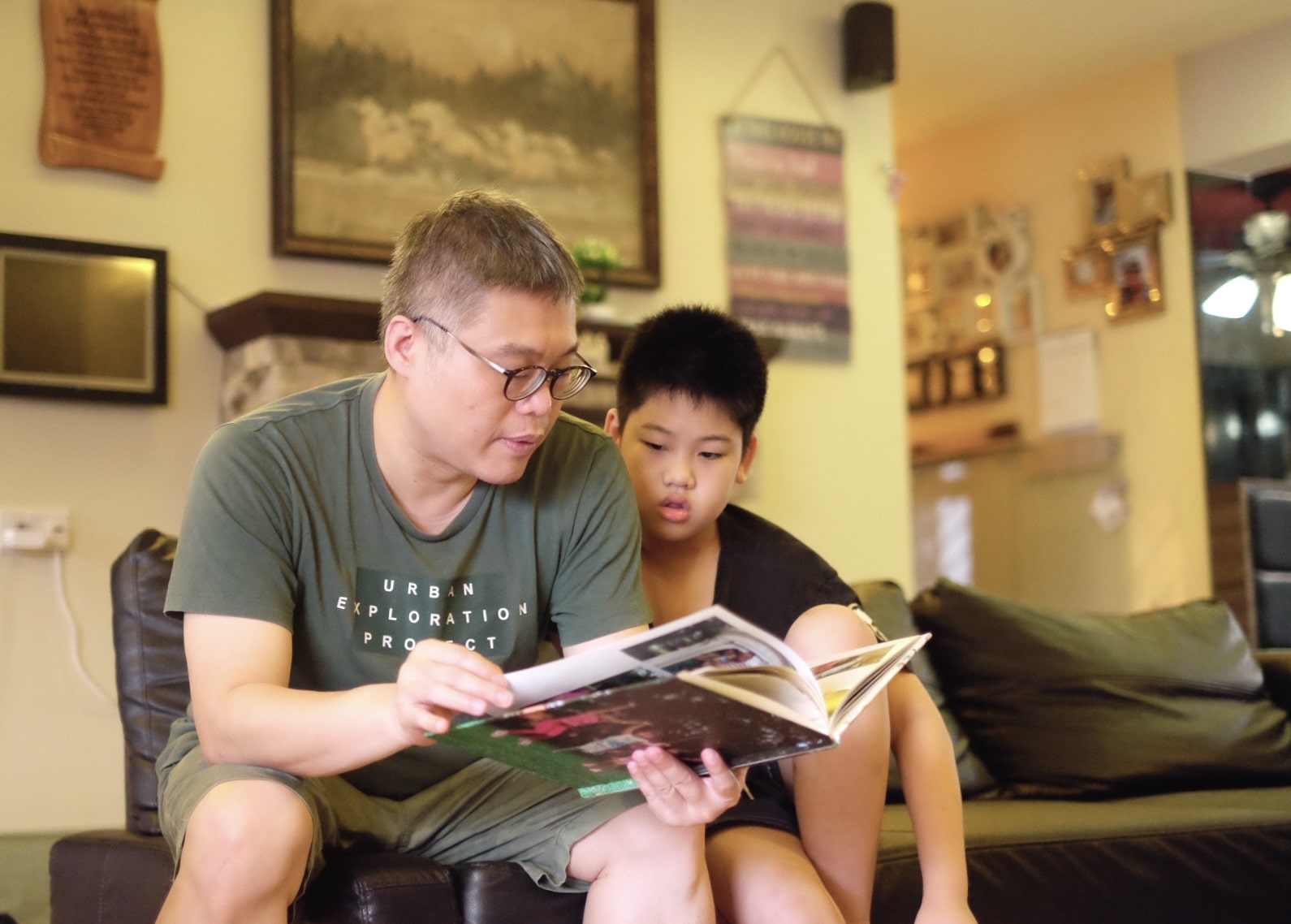
One-on-one time is important to the Sees. Michael and Samuel share a moment while waiting for the other members to gather for a family photo. The younger kids are having their pre-dinner fruit while the older ones and Karen are busy preparing dinner in the kitchen.
As teachers, they confess that it was challenging to have this mindset shift in their earlier years as parents.
“I had to constantly remind myself that results are not the be-all and end-all. It also doesn’t mean that we don’t do our best.”
Said Karen: “I struggled with it, whether to join the rat race. I had to constantly remind myself that results are not the be-all and end-all. It also doesn’t mean that if we’re not part of the rat race, then we don’t do our best.”
The peer pressure did not help either. Michael said: “It was such a struggle when Ariel didn’t grow up with enrichment programmes. My peers – their kids were going to Montessori classes, dance lessons, speech and drama classes. It was difficult to avoid all this talk.”
There was self-doubt, he said, particularly when they were new parents and had just three kids. “So we prayed, and so far, after we prayed and talked about it, God has given us peace. Nothing but peace.
“We go back to the Bible. If they don’t excel in studies, it isn’t an end-all, and it doesn’t mean they’re not our kids anymore. If they have to go to the Normal (Technical) stream, it doesn’t mean we don’t love them as much.”
“After we prayed and talked about it, God has given us peace. Nothing but peace.”
He recalls a few proud parenting moments, during Ariel’s Primary School Leaving Examination (PSLE) period. She chose to attend the wake of her parents’ church friend, despite having an exam paper the next day. The week before, when asked if she wanted to spend a few hours with the family to distribute care packages to low-income families or stay home to study instead, she chose the former.
“I was secretly happy that she understood that there are things in life which are more important than studies and results.”
They have also asked Ariel, when she went through PSLE and ‘O’ levels, if she needed tuition, and so far, she preferred the status quo of doing without it.
“Singapore is a competitive country, but all the more, as Christians, we must stem the tide.
“If my kids are getting ‘A’s but not caring for the community or doing good work to help the cleaners or low-income families, I’ll be the saddest dad in this country.”
Role-modelling and instilling discipline
Before the Covid-19 pandemic, since 2017, the family has regularly volunteered with Metropolitan YMCA’s M.Y. Manna programme, which supplies groceries and toiletries to low-income families. They also make it a point to greet essential service workers.
“It’s about being aware of the invisible service workers around us,” said Michael. “We’ve always greeted or thanked the cleaners and bus drivers whom we come across, and the children have grown up doing so daily. They need to be aware that all these people are human too.”
He adds that role-modelling is important. “If you want the kids to do something, be prepared to do it yourself. I greeted the cleaners and bus captains until the kids saw it as ‘normal’. They will do the same, in time.
“I started buying drinks and giving them to the cleaners – they see, then they will follow, because they will know that it is the right thing to do. Some things are best caught, not taught.”
The same applies to the use of digital devices. No one in the family uses his or her mobile phone during meals.
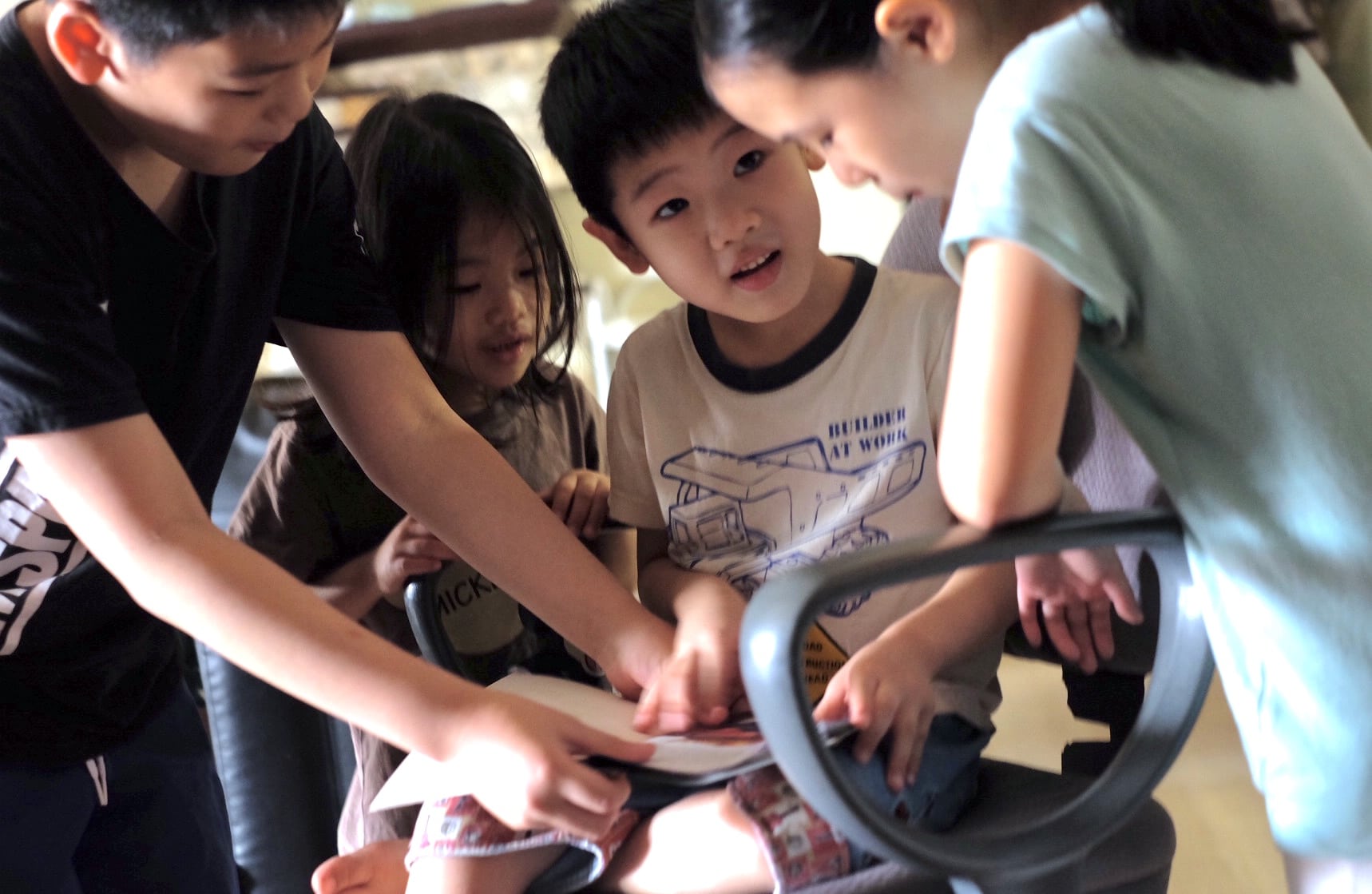
The kids seldom use their handphones and entertain themselves with books and games though all the siblings who attend school have one.
There have been family conflicts when the children spend more time online than on their studies.
“We cannot afford a lot of luxuries, but why do we need them? It’s not necessary for bringing up kids.”
“Laptops and handphones will be confiscated, or non-essential apps blocked, till the exams are over. If they need to submit homework via email, they use their parent’s account.”
Once, one of their daughters was given a “digital ban”, after she was found to be using the laptop the whole day, from 7.30am to 10pm, except during mealtimes when she had not submitted her work.
The Sees gave multiple warnings, then confiscated the laptop and phone for about a month, till her exams were over.
Karen explained: “She had too much work that was not submitted. She was spending all day online.”
Michael added: “She has very caring sisters. So we told them, ‘If we catch you lending (your device) to her, yours will be confiscated too.’”
Schooling the kids in values
When asked if Karen would consider returning to teaching, to get more income as living costs rise, children’s appetites grow, and the family incurs more expenses such as polytechnic and university fees in the future, her husband said it would not be because of the need to get more income.
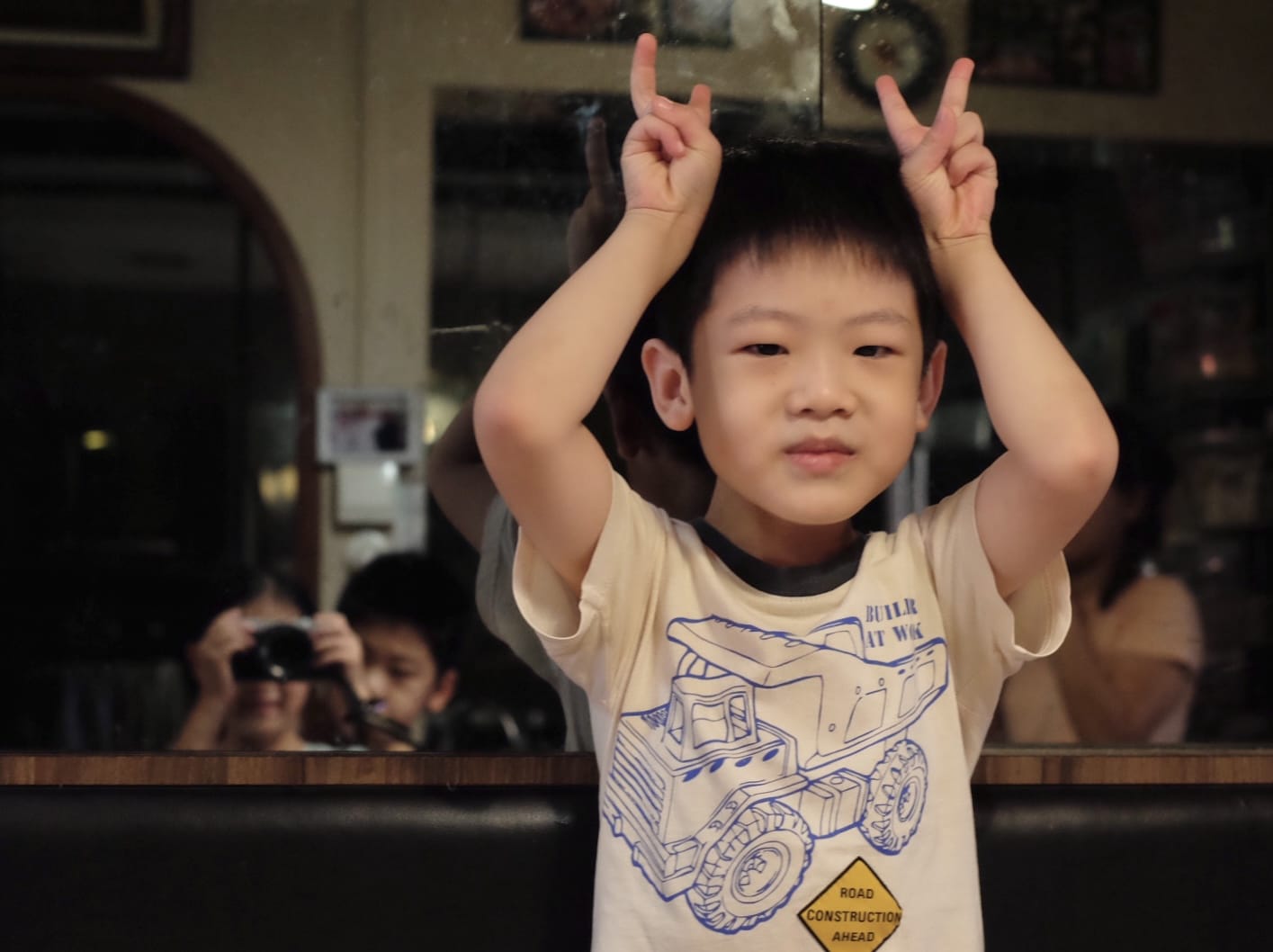
Gabriel, 5, poses for the camera which Samuel, 10, and Zuriel, 7, are playing with.
“The Bible does not mention working to get more income. It is what humans want or perceive they want, to aim for a ‘better’ quality of life. Will getting a bigger house or nicer car make us feel better? Will it mean that we can help more people?”
“Values education is way more important than results, enrichment and tuition.”
With half her brood aged seven and below, Karen said she may consider returning to teaching only when they are in secondary school and the hours are longer. But she also wants to be home for them.
“During their secondary school years, I think it’s even more essential that there’s someone that they can come home to. They need more emotional support at that age.”
The See parents said it could be challenging to cope with the higher expenses, but it is just a matter of readjusting their budgets and removing some luxuries.
“We cannot afford a lot of luxuries, but we don’t need them. If it’s necessary, I’m sure the Bible will mention it,” said Michael.
“Adults should role-model what they want their child to be. Values education is way more important than results, enrichment and tuition.”
Look out for Part 2 on the See family: “Our family relies on God”: Parents of 8 kids were once at risk of being childless” on Salt&Light next week.
RELATED STORIES:
Novel Coronavirus: China’s pastors go digital to spur flock on to faith and prayer
We are an independent, non-profit organisation that relies on the generosity of our readers, such as yourself, to continue serving the kingdom. Every dollar donated goes directly back into our editorial coverage.
Would you consider partnering with us in our kingdom work by supporting us financially, either as a one-off donation, or a recurring pledge?
Support Salt&Light